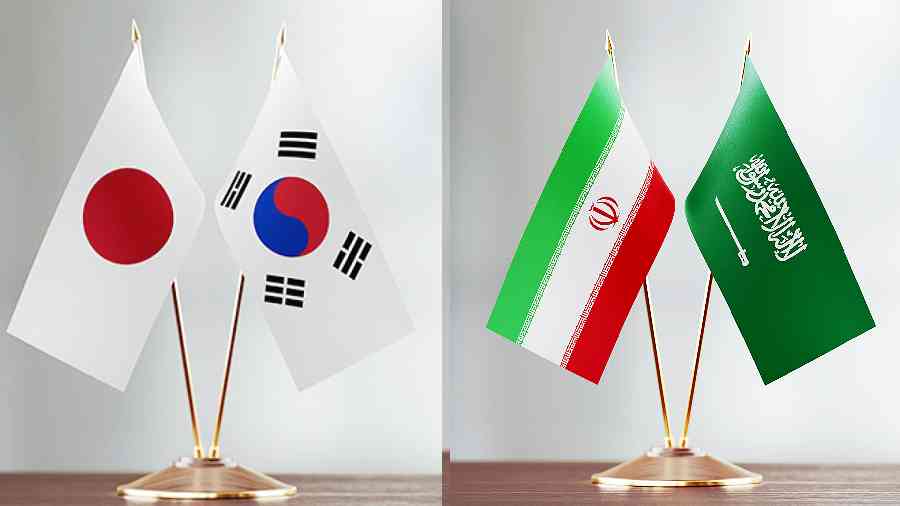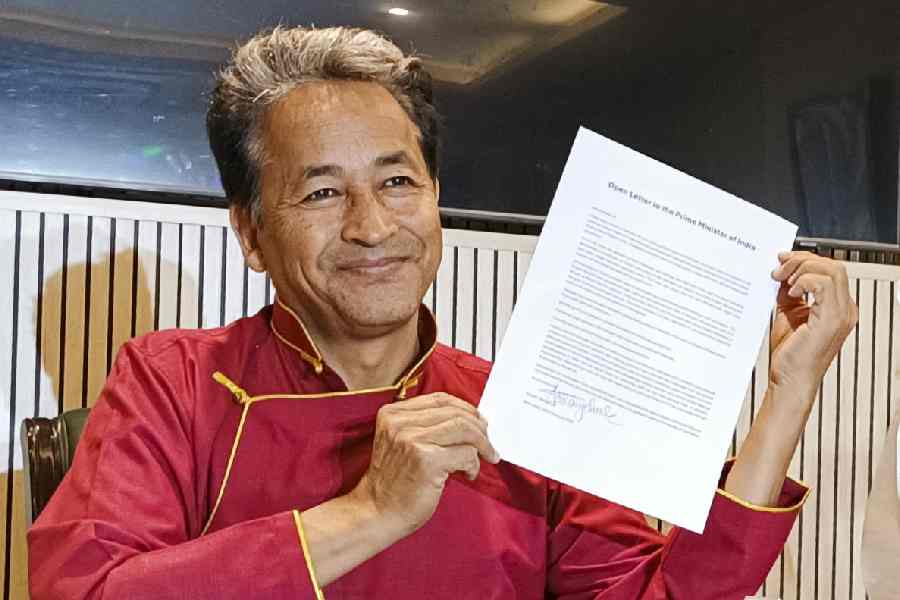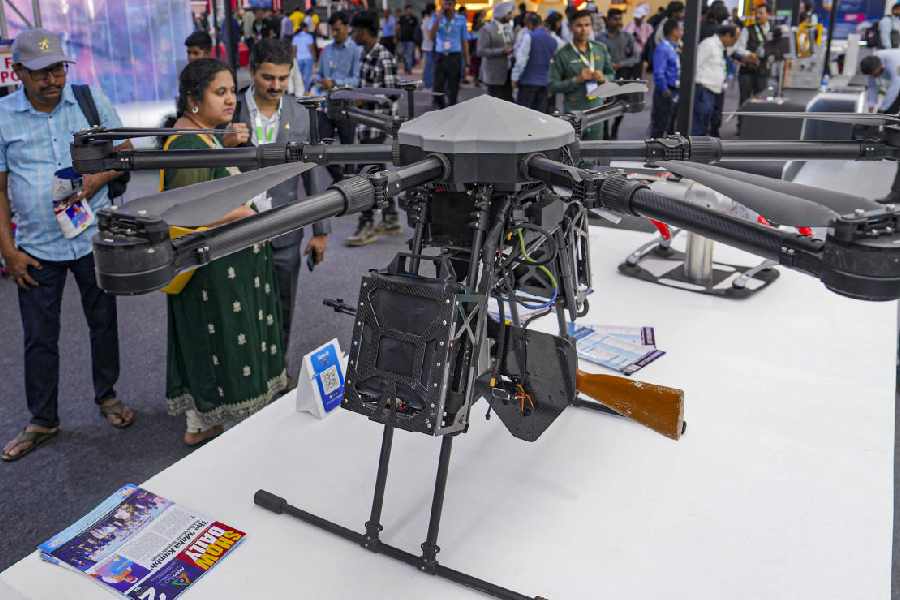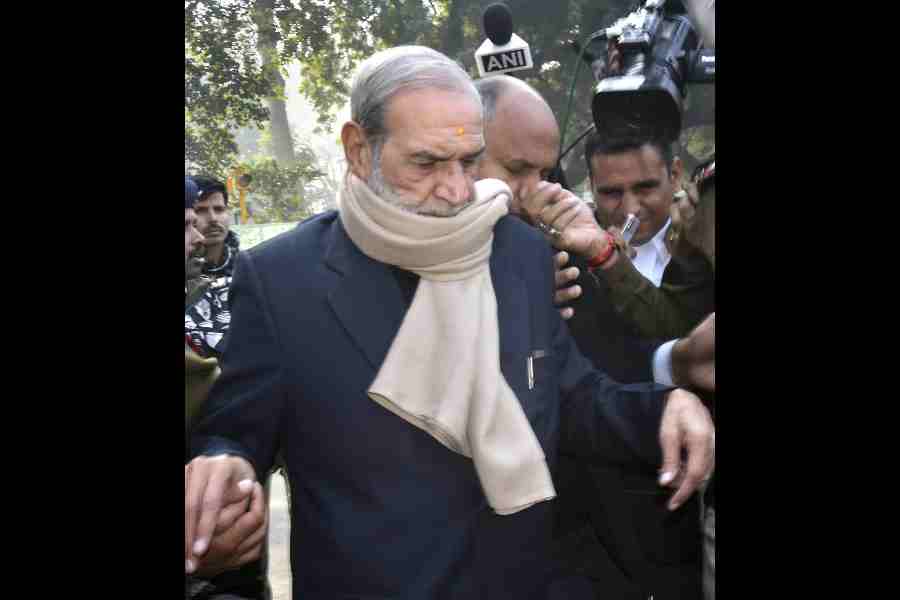Two unusual developments have punctuated the normal routine of international diplomacy in the past few days. One is to our east and the other to the west. Each offers a contrast to the contested and securitised narratives that have dominated the news cycle recently.
To our east, Japan and South Korea announced on March 6 that they have settled differences on the highly emotive dispute over the issue of wartime forced labour. Japan’s conduct during World War II has long bedevilled relations between the two countries. Memories of brutal exploitation, including sexual exploitation, by the forces of imperial Japan have formed the unresolved core of the relations between the two countries since diplomatic ties were established in 1965. As recently as 2018, a flare-up over the issue had led to Japan withdrawing its most favoured nation treatment for South Korean exports and South Korea withdrawing from an intelligence-sharing agreement. Outsiders not aware of just how deep this divide was had good reason to be baffled — both countries share many points of common interest and are strong allies of the United States of America. But the issue of forced labour, important in itself for South Korea, is also metaphorical of older rivalries, identity issues and different, even conflicted, readings of history — in brief, a cocktail of grievances and grouses not dissimilar to what we have in our neighbourhood.
What this latest Japan-South Korea agreement — its details are less important to us as distant observers — underlines is the realisation on both sides of the virtues of patient, even old fashioned, diplomacy: skilled negotiators steeped in knowledge of their interlocuters’ approach and limitations finding sufficient common ground to reach an agreement. Perhaps what drove both sides to do so was the realisation that each was subject to the ramifications of wider geopolitical changes, such as Chinese assertive behaviour, the war in Europe and others.
It would be illusory to imagine that politics in Northeast Asia will change completely. This is not the first attempt to resolve such disputes. Complexities and divisive memories will always clutter the South Korea-Japan diplomatic interface. However, what underwrites this latest rapprochement is the understanding of deep divisions and the simultaneous recognition that managing these differences is essential because both countries are entering a phase of wider turbulence over which they may not have much control.
The counterpart development to our west is the announcement of a Chinese-mediated agreement between Saudi Arabia and Iran to restore diplomatic relations that was announced on March 11. In this, it is the Chinese role and its implications that are being most commented upon. Clearly, it marks China’s entry into the highly-contested terrain of intra-West Asian diplomacy, for long the exclusive domain of the US with occasional roles being played by Russia or the former colonial powers, the British and the French. To some, West Asia and the Gulf are now yet another theatre where the US-China rivalry will play out.
Yet too sharp a focus on China’s role, significant as it is for its wider implications, denies the Saudis and the Iranians any real agency and obscures the fact that the real impulse for this move came from them. This effort at some minimum rapprochement has clear bilateral roots, and for much the same reason as that between South Korea and Japan — Saudi Arabia and Iran foresee tumultuous times ahead and, therefore, recognise the importance of tethering down at least those elements that are in their hands to control.
The Saudi-Iran agreement — all the details are not known — should also not be exaggerated. It may just be a return to the status quo ante that existed before 2016 when diplomatic relations were broken amidst a spike in tensions for a cluster of reasons. The restoration of ambassadors by itself will not resolve Saudi-Iran tensions over a host of issues — Yemen, perceived Iranian revisionism, Iran’s nuclear ambitions and so on. Neither does it mean that a vast historical baggage, including the Arab-Persian divide or deep-rooted Shia-Sunni differences, can be set aside. The eruption of Saudi-Iran differences in 2016 was not the first time that relations had deteriorated quickly or diplomatic ties had been severed. Since the Iranian Revolution of 1979, this had always been an accident-prone relationship marked by deep suspicion and strategic distrust and it may well remain so.
Historical disputes, geopolitical rivalries and contestations do not get easily resolved. But understanding that they are a potentially incendiary cocktail means adding diplomacy to the measures available to manage and temper such situations. In each of these countries, there will inevitably be many naysayers or those who feel that there may have been a ‘sell out’. They will point to the inevitability of further breakdowns and crises. Many in Japan are, for instance, convinced that South Korea will never be able to overcome the issues of forced labour and sexual exploitation as its domestic politics will keep them alive and their relationship hostage to it. In South Korea, many feel that Japanese contrition and admission of remorse have always been insincere and the rise, once again, of Japanese nationalism means that its past history will remain a factor which its neighbours will not be able to ignore. There are similar, perhaps even stronger, suspicions and insecurities in Saudi Arabia and Iran that cement a basic strategic mistrust of the other.
Each of these is a valid concern. None can be dismissed as arising simply out of prejudice or paranoia. Real differences do exist between neighbouring countries and that is why there are separate nations. The point is that modern diplomacy has been designed as a tool for precisely these situations. It may not always be successful and it certainly does not imply that force in international relations is an outmoded concept. But in many situations, the alternatives to diplomacy are far, far worse. One year into a war in Europe and on the 20th anniversary of the invasion and the war in Iraq, it is a good time to remember that.
T.C.A. Raghavan is a former High Commissioner to Pakistan and Singapore










